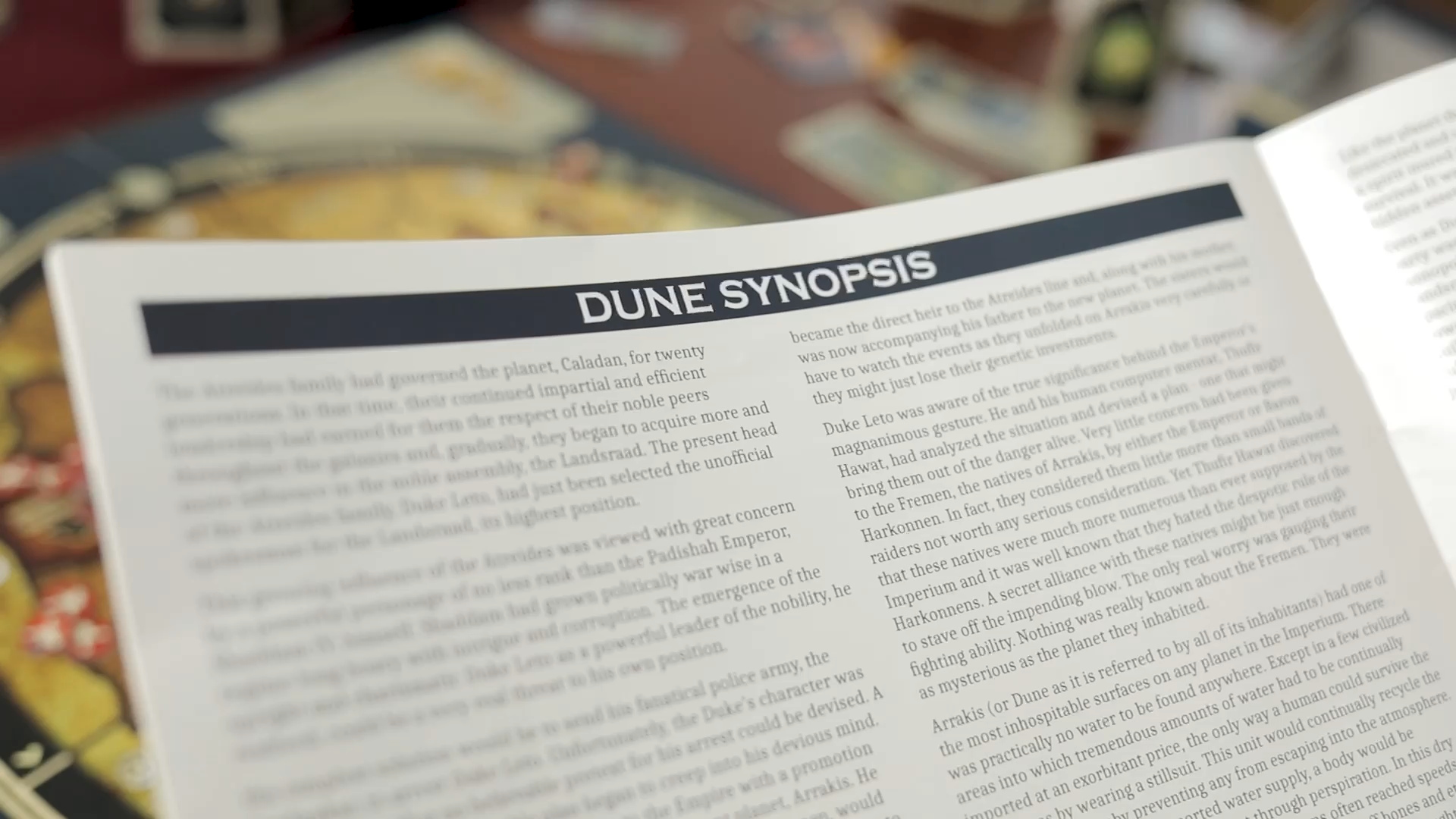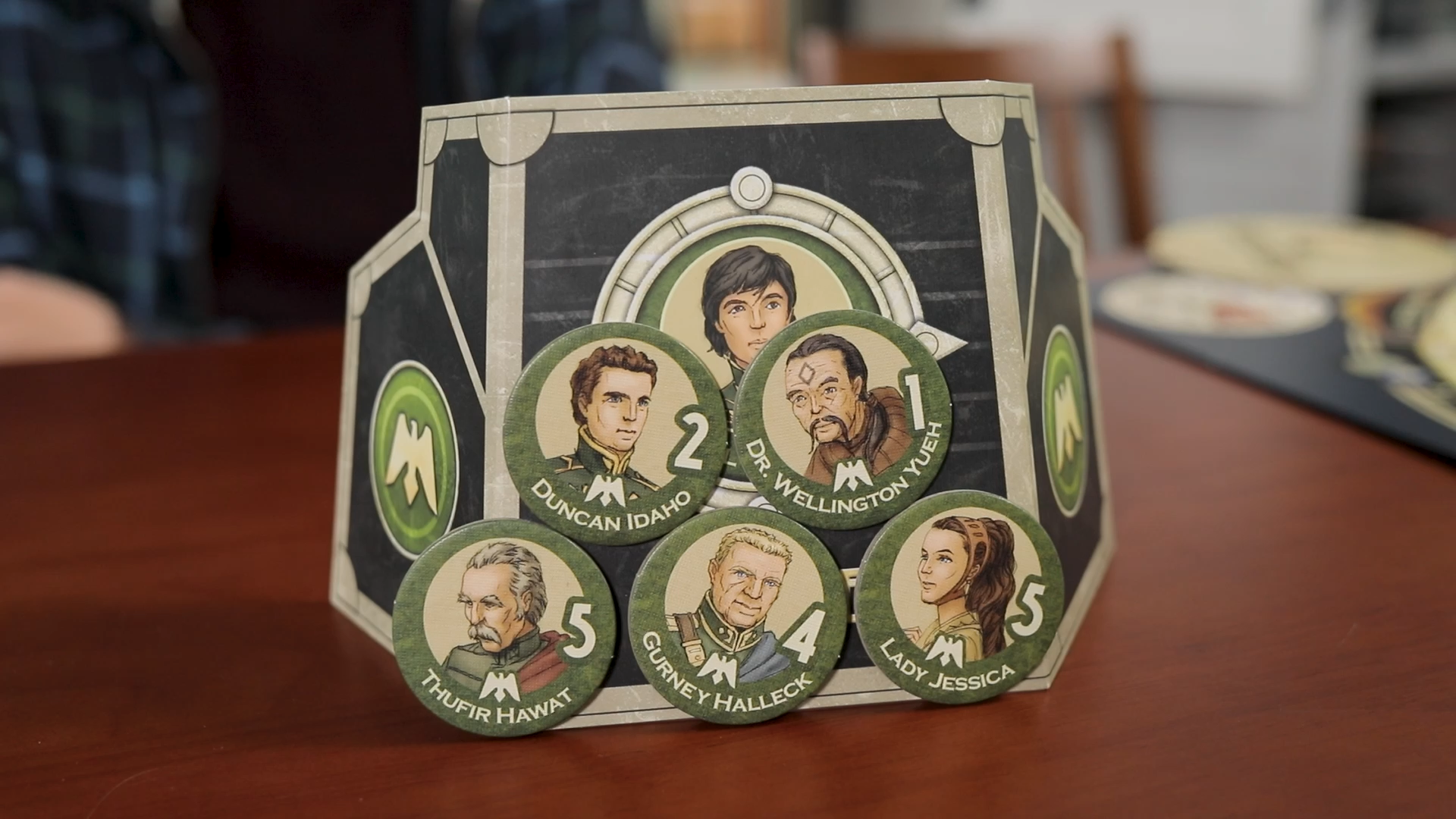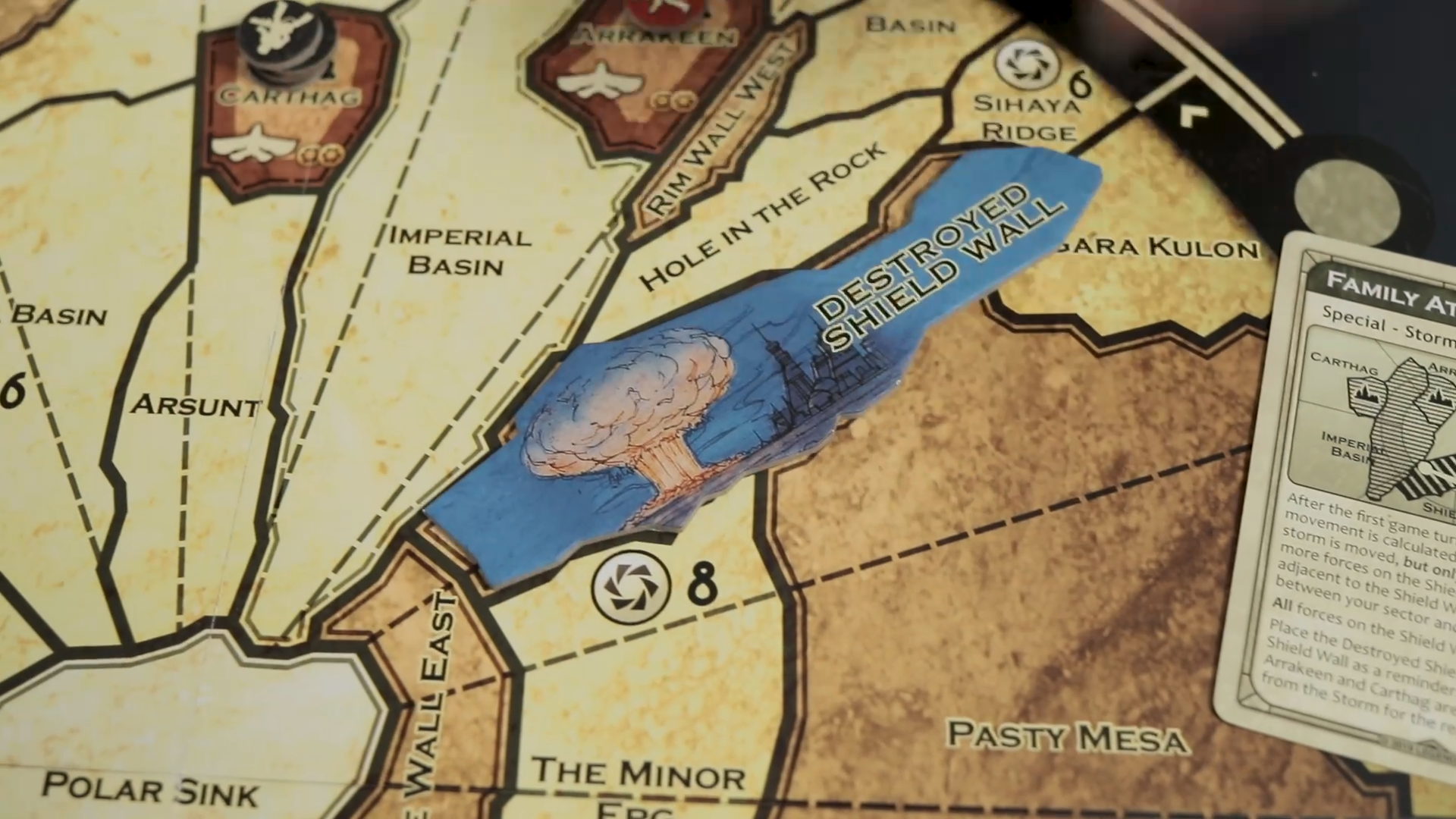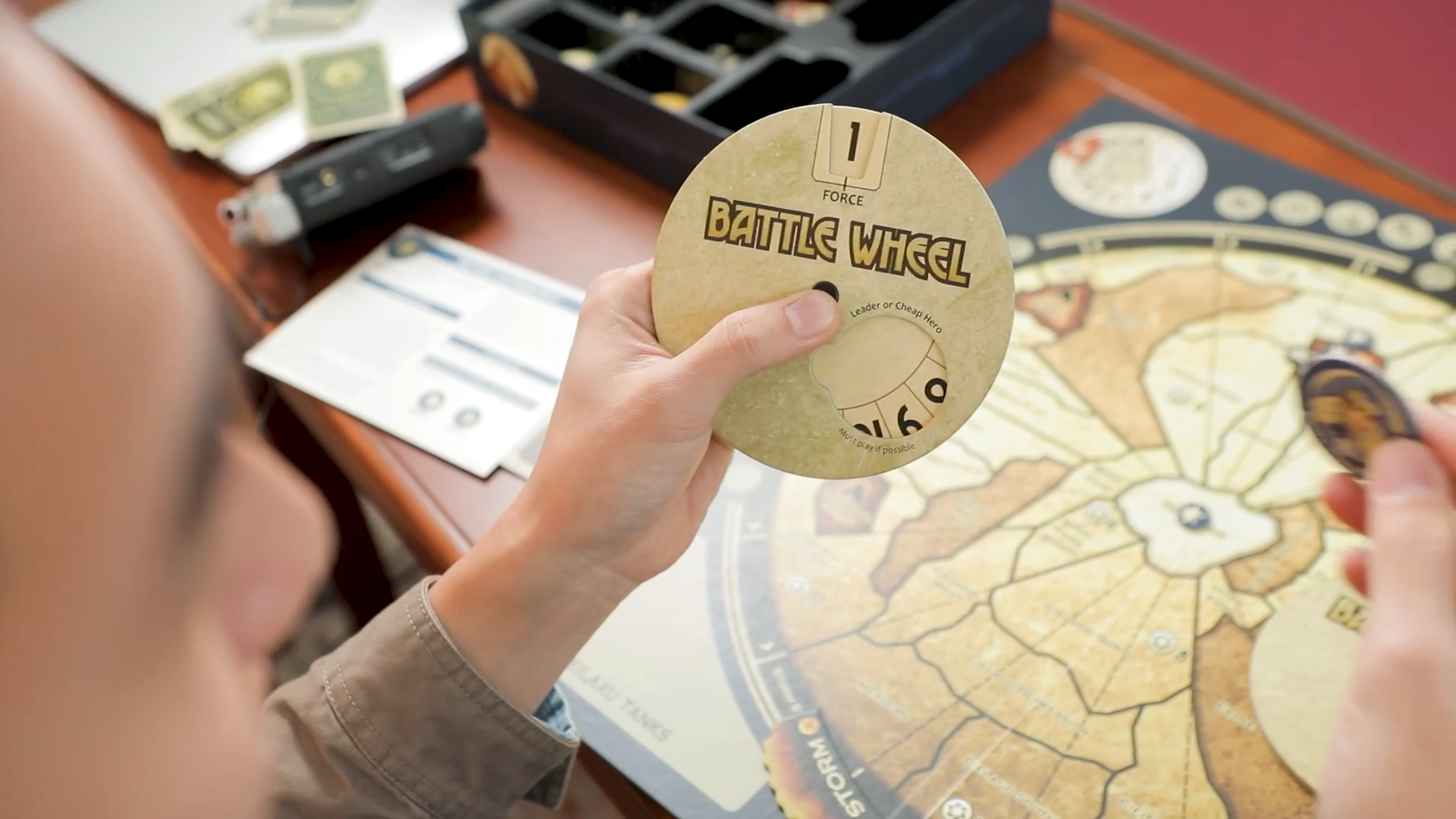Dune (2019) Review
Outdated by modern board gaming standards, but is so incredibly thematic and uniquely diplomatic that you might not mind.
Players play as one of the six houses to control strongholds on the planet Arrakis, in an epic area control game of 2-6 hours.
Video published December 20th, 2019

Truly enter the universe of Dune, with incredibly thematic elements everywhere.

Play as 1 of the 6 Great Houses with their own abilities and leaders.

Fight over the desert planet's strongholds, and blow up the shield wall to help you.
Overview & How to Play
Dune is the long-awaited reprint, of FORTY YEARS, of the area control game based on Frank Herbert’s titular Dune novels. In fact, it isn’t that different than the 1979 version in gameplay.
The goal of the game is to take control of 3 out of the 5 strongholds, with a limit of 10 rounds. There are 6 different factions—with playstyles all very faithful to the source material—each with their own unique strengths and weaknesses.
Dune has a heck of a lot going on, so the bare basics is that players are dropping units on the planet’s surface, using money, or spice, to pay for that. Then they can move armies each turn to reposition. When it’s time to fight, players will grab a battle wheel each, denoting how many units they want to commit, which will dictate their battle strength. But this amount is really important, because each unit you send in, even if you win the fight, will die at combat end. The loser will just lose all of their units.
Things that spice up combat are unique leaders for each faction, which add a bonus to fighting strength, and then there’s treachery cards can be played that can kill your opponents’ leader or protect your own.
There’s also something called a Traitor, where if you were dealt the same card at the beginning of the game, that matches the leader that your opponent is currently using against you, you can reveal it, and IMMEDIATELY win that battle no matter what, no loss to yourself.
At the end of the round, just check to see if anyone won the game with 3 strongholds. Also, alliances are possible, so if those are active, those teams need 4 out of 5 strongholds to both win the game.
Pros
Aside from the fitting aesthetic, the theme of Dune is absolutely spot on with the books. So much so that the strategy for the different factions basically falls in line perfectly with what they’re actually trying to do in the source material. There are many extremely hyper specific factors littered all over the gameplay that a Dune fan would notice and appreciate, making Dune the Board Game an extremely faithful adaptation.
Examples of this include the win condition for the Fremen, which wins them the game if they can successfully clear spaces to terraform the planet; or the Family Atomics treachery card, which essentially lets someone blow up the shield wall, allowing the Imperial Basin, Arrakeen, and Carthag to be vulnerable to the storm.
Speaking of all these different factions, their asymmetry is done very well, both in balance as well as how faithful their abilities are to the books. Everyone is going to play quite differently from each other, as each faction has some method of circumventing the basic core mechanics. To use movement as an example, the native Fremen can traverse the planet more easily, moving further than others on the planet, and the Shipping Guild only pays half cost to ship on to the planet.
On top of unique abilities, some factions have unique win conditions, further diversifying their gameplay differences. For instance, at the start of the game, Bene Gesserit can win by secretly predicting who and when someone will win. They want that prediction to come true as it steals them the victory instead, meaning that it’s in their interest to aid their predicted faction at key moments to help nudge them along that path.
Dune is filled to the brim with all sorts of really cool abilities like this. We especially want to point out the Truthtrance Treachery card, because it forces players to think creatively about how they’re going to use it. It’s very open-ended, since all you’re doing is asking someone a yes/no question that must be answered truthfully, but that alone creates endless utility. Also shoutout to the Bene Gesserit’s voice and Atreides’ Battle Prescience, for making their fights generally more interesting to think about.
Politics is a staple of area-control games, and Dune is no exception. Every faction has an alliance card that they can give out to another player in order to form an alliance, and these cards offer benefits that can drastically help cover each other’s weaknesses. The thing is though, is that because these alliances cannot be broken and formed at will, it leads to very interesting decision making since you never know when you’re going to be able to form new alliances. Players will absolutely be constantly scrambling for more favorable positions and allies as conditions and alliances change.
Combat is very well balanced in that all the factions that don’t passively generate spice have some sort of clear advantage while fighting, while the rich Spacing Guild and Emperor can more effectively pay to buff their troops and move them around more. Everyone has clear strengths and weaknesses that must be utilized and exploited if one is to find success in combat.
Cons
To kick off the cons, we sometimes times have a poor idea what’s going on visually with the game state on the board. There’s a tendency for units to not fit unless stacked, which can make it a nightmare to count, and they also fall over from that stack very easily.
This is especially annoying for newer players or those who aren’t fans of Dune because there’s plenty of effects in the game that involve a specific location, and it’s hard to see names when everything is just so cramped.
We also have gripes with the rules being unclear. Dune has a lot of janky wording that can have open ended interpretations. Over our playthroughs we had countless amounts of trivial arguments over things like bribes, alliances, Karama cards, you name it. There needs to be more clarifications in the rulebook because the FAQ just doesn’t cut it.
These are all faults towards the accessibility of Dune, and the presentation feels somewhat scatterbrained. We care about this so much because it just hurts the experience in doing literally anything in the game, especially planning out combat in a war game. We really don’t like how faction specific Karama effects CAN ONLY BE FOUND IN THE RULEBOOK.
Okay now for some cons involving leaders as a mechanic. They generally work pretty well, but the traitor mechanic is obscenely strong for something that can happen at the beginning of the game, which is the worst time to get Traitor-ed, since that’s when you have all of your units alive and well. Losing a good chunk of your forces early on legitimately sets you back by a few rounds, due to how expensive it is to pay for revival and shipping. Traitors are an inherently random mechanic that is extremely powerful, where it does have counterplay potential if leveraged properly, but sometimes you’re forced into bad fights, and the leaders you have that you know aren’t traitors are all dead, so then it’s a toss up of auto-losing the battle or not.
For the leaders themselves, having your leaders die is extremely punishing since you can’t revive them until ALL of your leaders have died. Plus, not being able to quickly revive strong leaders is incredibly debilitating and makes you easy prey, especially if your strong leader died in a fight you lost, which probably means you’re already losing.
Because of how punishing losses are in this game, it makes the early game aggression of Harkonnen stifling, assuming they win their fights. For newcomers, you’ll most likely experience a Harkonnen victory in the first few rounds while everyone’s figuring everything out. But even once everyone’s decently experienced, there’s still the chance that the Harkonnen player gets lucky because he got to use multiple Traitor cards early on and drew very aggressive treachery cards, while the other players lack defense cards. Like sure, Harkonnen is balanced around not having nearly as much leverage later in the game, but if they happen to get lucky with their draws and take an early lead, you’re gonna basically have to have the whole table fight against them, which is pretty ridiculous.
The game length variance is also abysmal to plan around, where games could end in 2 hours with an early Harkonnen win, or actually last upwards of 6 hours, making it very hard to plan around. Since Dune is a mandatory 6 player game, this makes scheduling very difficult for some groups.
We aren’t sure if we just got a bad copy, but we constantly had a problem with the Battle Wheels falling apart and generally being too loose, occasionally pivoting to the wrong number, especially when considering the half numbers in advanced rules. Plus, it’s also probably a little too small in the advanced rules where you have to hide cards, your leader, AND spice behind it, which is pretty awkward to hold together. For more concerns with spice in combat, check out the video review.
Final Thoughts
Our main gripes with Dune center around all the janky-ness that probably just comes from its archaic design. After all, the game wasn’t really fundamentally changed at all in comparison to its original version 40 years ago. It basically just got a fresh new coat of paint with all the new art and clarifications on certain rules.
To paraphrase TragictheBlathering’s review on BGG, Dune really showcases how newer games have gotten really good at streamlining phases and actions so that complexity lies in decision making instead of in mechanics. In newer games, you will typically find that they are much easier to explain and jump into, and the depth doesn’t come from memorizing and understanding layers upon layers of confusing mechanics, but instead learning how to make good decisions within a sandbox of precise and straightforward parameters.

















